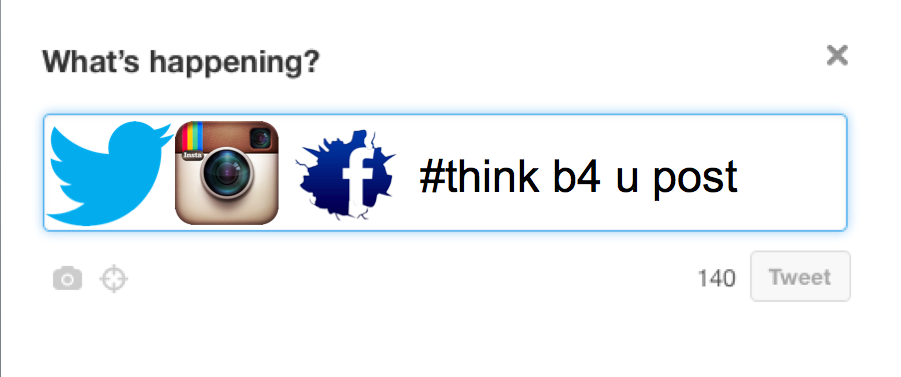People long ago probably never thought that there would be a day when the whole world would be totally connected and people thousands of miles away could talk to each other in real-time. However it is a new day and age and today, we live in a world where we are totally connected through social media. Social media allow us to keep in touch with people by using the Internet. It also allows us to share information and divulge it to the entire world within a matter of seconds, but these days, social networks come with great responsibilities.
Long ago, people did not have these modern conveniences, but to many today, it seems nearly impossible to go a few hours without updating their Twitter statuses. Chances are you too have a social network whether it is Twitter, Facebook or Instagram and you are in constant connection via apps on your smartphone.
At some point in your lifetime, you have probably heard the expression; “think before you speak” and today “think before you post” is becoming more relevant. It is important to ask yourself this prior to composing a tweet, Facebook status update or an Instagram photo.
Nowadays, college admission officials and employers are turning to social networks to research potential students and employees and thanks to a ruling by the Federal Trade Commission; a social media background check is now possible. The FTC ruling authorizes companies to provide reports on an individual’s online actions by reviewing up to seven years records, which is similar to a credit report. These records include everything from what you post on sites like Facebook, Twitter and YouTube, Craigslist ads and blogs. So, whatever you are now posting online, may affect what college or what job you get into years in the future. Colleges and Employers also scan for things like drug use, drinking, racist remarks and sexually explicit images. However, there is good that comes out of these background checks. These checks do not only check for negative activity, employers are also able to see the good things you may have posted on your profile, like involvement with charity organizations.
Would you be able to pass a social media background check? An easy way to check is to Google yourself and see what comes up. Going through all your photos and deleting questionable ones is a good way to clean up your social media record. Un-tag yourself from photos you don’t want to be associated with and go through your old status updates and delete things like profanity or anything you would look at and shake your head.
Although going through pictures and posts is a good way to remove suggestive content, it only deletes the information from public view. With advancement in technology and tools that can search through website archives, nothing is permanently deleted. Whenever something is posted on the Internet, it is out of our hands and it goes into cyberspace. Again, nothing is permanently deleted from the Internet and your posts are forever floating in cyberspace and can be retrieved with a few clicks of the mouse.
So next time you think about posting a photo from that party of you holding bottles, think, “is this really a message I want to be sending out to potential employers?” Stopping and thinking about what you’re about to post before you post it is the best tool to keep your social media background clean. By asking yourself this simple question, you can protect yourself from being passed up on a job offer or not being accepted to the college of your dreams. This is why it is imperative to be careful what you post on the Internet because your posts are like a ghost, it can come back to haunt you.

